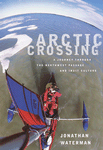|
|
 
Arctic
Crossing
|

The Quotable Climber
A Most Hostile Mountain
Kayaking the Vermilion Sea
Cloud Dancers
In the Shadow of Denali
High Alaska
Surviving Denali
|
|
|
 |
| |
|
|
|
 |
|
|
 |
 |
 |
 |
|
Jonathan Waterman has worked as a naturalist, Outward Bound
instructor, park ranger, boatman, mountain guide, freelance
writer, magazine editor and director of a small press. He
developed, wrote and appeared in the television documentaries
The Logan Challenge, for PBS, Surviving Denali (which won
an Emmy), for ESPN, and Odyssey Among the Inuit, for the Outdoor
Life Network. Widely known for his diverse experiences on
Mount McKinley, he quietly began traveling to the Arctic and
its villages twenty years ago, sowing the seeds for Arctic
Crossing. He lives in Colorado with his wife, June, alongside
out-of-the-way national forest land and the world's largest
aspen grove.
|
|
 |
 |

The Arctic--with its twenty-four-hour daylight, surprisingly
curious animals and inexplicable humming noises--is a world
of constant danger and limitless possibility. This unforgiving
landscape is home to the Inuit (the name they prefer to "Eskimos"),
whose complex and little-studied society is fascinating in
its divergence from as well as its assimilation into Western
culture.
Jonathan Waterman's 2,200-mile journey across the roof of
North America took him through Inuit communities in Alaska
to Nunavut, Canada's new, 770,000-square-mile, self-governed
territory. His story, at once illuminating and alarming, offers
firsthand observations of their life, language and beliefs;
records their reactions to global modernization; documents
their centuries of unjust treatment at the hands of Kabloona
(bushy-eyebrowed whites); and witnesses unemployment, teen
suicide and such persistent plagues as spousal violence and
substance abuse. From the perspective of his 1997-1999 voyage--as
the Inuit stand on the brink of a more hopeful, independent
future--he also looks into a past marked by famous (or infamous)
Arctic explorers, government cover-ups and environmental destruction.
This beautifully written work of intrepid reporting and even
scholarship also reveals the physical risks and psychological
perils of crossing the legendary Northwest Passage. Utterly
alone for weeks at a time, Waterman struggles against freezing
conditions, the tricks played on him by his own mind and dangers
more complex than aggressive bears, stormy seas and mosquito
blizzards. Following the advice of an Inuit shaman, who said
that "those things hidden from others" are discovered only
"far from the dwellings of men, through privation and suffering,"
Waterman kayaks, skis, dogsleds and sails across the Great
Solitudes in a thrilling and ultimately successful quest for
this "true wisdom," arriving at a profound understanding of
environment and culture.
|
|
 |
|
|
|

